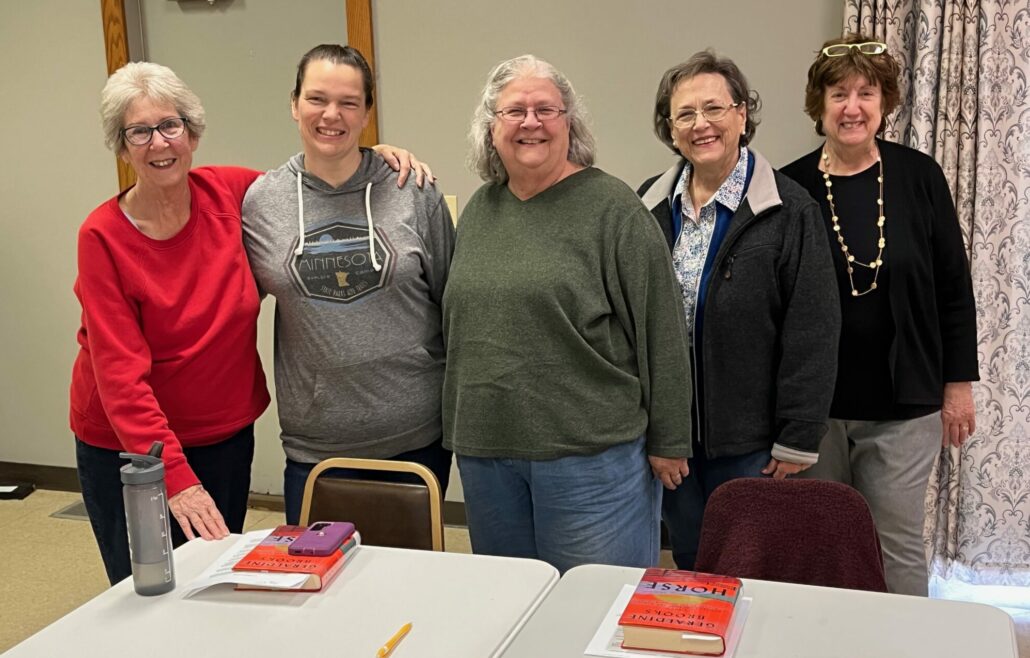By: Doug Wood, WMEAC volunteer
Pictured above are book club members from Muskegon Area District Library Holton Branch. We had a great discussion with this group.
This April 2023, to celebrate Earth Month, WMEAC sponsored a community read around the book “Braiding SweetGrass: Indigenous Wisdom, Scientific Knowledge and the Teachings of Plants” by Robin Wall Kimmerer. This book was written in 2013 and has gathered a large following in the past decade. In this groundbreaking book, Dr. Kimmerer combines her training as a botanist and her membership of the Citizen Potawatomi Nation together to show how we all need to awaken to a wider ecological consciousness that acknowledges and celebrates our relationship with nature.
The Community Read events were made possible through partnerships with the Muskegon Area District Libraries (in Dalton Township, Holton, North Muskegon, Norton Shores, and Ravenna), Hackley Public Library, Fruitport District Library, White Lake Community Library, and the Book Nook and Java Shop in Montague. Each partner provided space for the groups to gather for discussion and also made the books available to loan or purchase.
As a member of the Muskegon Area Climate Action Network (a WMEAC volunteer group), I was able to attend four of the events. While they varied in the numbers and age ranges of participants, there were some common elements that stood out for me:
Braiding Sweetgrass
This is a book that is accessible at many levels. Filled with indigenous wisdom and applied botanical knowledge, it can be digested in small or large amounts. Many of the participants have had the book in their personal libraries and have gone back to it often or were inspired to pick it up again.
Connecting Neighbors
Because we took the reads into the neighborhoods represented by the libraries and local business, there were local connections established around the joint appreciation of Kimmerer’s words and ideas. Out of that might grow some new community garden projects, sharing of garden produce, and community potlucks.
Personal Connection to the Reader
In almost every group, the book created a connection to someone in the lives of the reader. It might have been a family member (mothers and grandmothers were popular recollections), a special teacher who created awareness of nature, or a friend that shared an experience that helped them understand their world more deeply. For me, it took me back to Muskegon Community College and walking the dunes with the great science teacher Casey Hartz.
Feeling a Call to Action
The readers that gathered around this book were almost all moved to DO something. Not everyone has the same level of capacity for climate activism, but we all agreed we could make some kind of change in practice or attitude that would help us connect to the natural world around us. A common theme was how the book increased our personal awareness to things we take for granted – like appreciating the flow of rain drops. Many joined the WMEAC newsletter email group.
New Awareness to Something That Has Become Familiar
Because Kimmerer recognizes and helps us understand our connection to the natural world, many of the readers described how thankful they were to have received the gift of awareness of the everyday world. We are so blessed to have so many wonderful habitats in West Michigan. Reading a book like this can help us get out there and find a new or deeper connection to the lakes, rivers, and woods.
An Appreciation for the Native American History of West Michigan
Before the actions that nearly destroyed the Native American culture and language, the area of Michigan we live in was populated by the Potawatomi Nation. Many of the readers did not have an extensive knowledge of the indigenous people who lived here but vowed to increase their education. This book can be an excellent step off point in that learning.
Thank you to the members of the Muskegon Area Climate Action Task Force who helped to facilitate our book discussions this Earth Month. Thank you also to the librarians and book group leaders who worked with us to schedule all our sessions.

